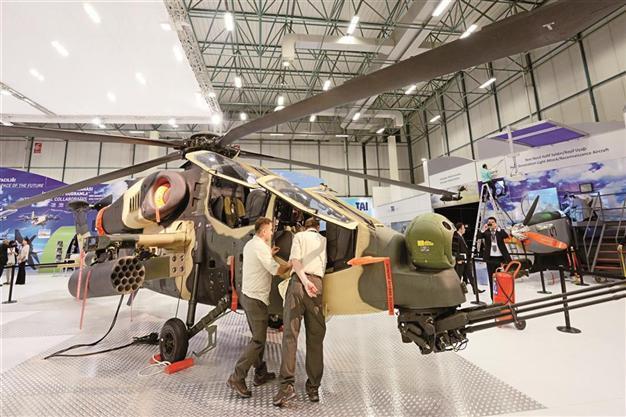Turkey accelerates defense Silicon Valley
Burak BEKDİL

A new defense site aims to bring Ankara-based firms to Istanbul know-how. DAILY NEWS photo / Emrah Gürel
Turkey’s commercial capital Istanbul generates an annual $140 billion and houses about 50 universities, but the country’s defense heavyweights are overwhelmingly located in and around the official capital Ankara. Now it’s time defense companies put one foot in Istanbul to make sensible partnerships with the world’s most prominent advanced technology companies and university-generated “science” in Istanbul.
The Undersecretariat for Defense Industries (SSM), Turkey’s sole defense procurement agency, wants the accumulated scientific and industrial knowledge in Istanbul to be introduced to the national defense industry. The venue for that ambition will be Teknopark Istanbul that opens late in August.
“Our principal mission is to contribute to the national innovation system and to boost the local industry’s international competitiveness through multinational partnerships and technological advancement. That’s a mission fully in line with the Turkish government’s strategic objective of creating an increasingly independent, competitive and export-oriented local industry,” explains Teknopark Istanbul’s CEO, Turgut Şenol.
Turkey’s “defense and aerospace Silicon Valley,” will operate a 950,000-square-meter indoor space at the Sabiha Gökçen Airport, accommodating more than 30,000 people, 1,000 top advanced technology companies, 18 universities and targeting $10 billion in defense and nondefense business annually, to become one of Europe’s largest technology parks.
Defense priorityŞenol aims to bring together companies and universities in Istanbul, targeting strategic fields like aviation, maritime, electronics, information technology, nanotechnology, energy and automotive, biotechnologies, automation systems, and robot technologies. Contracts have been signed with over 100 companies for the first phase of the project. SSM’s chief, Murad Bayar, once described Teknopark Istanbul as “Turkey’s best technological center.”
The huge lab’s major shareholders are SSM and the Istanbul Chamber of Commerce. The partners will spend $4 billion in the project in the next 12 to 15 years.
“This is not a profit-targeting venture for either partner. Presently, over 1,000 international companies are headquartered in Istanbul. We want these multinational entities to have a view of Istanbul not only from a commercial dimension, but also from a technology development aspect. We want to improve innovation on a national level by making us of local and foreign partners here and, thus, to turn scientific and academic knowledge into high-tech commodities,” Şenol explains.
Defense will be a priority sector but not the only one.
The defense industry is often a recipient of technology from several other sectors. There are many non-defense industries which supply technology to defense industry. “Aviation will have a special place in this project, as evinced by the fact that Teknopark Istanbul is located at one of Istanbul’s two airports. It will become one of the major reference points in aviation technologies in the next few years,” Şenol said.
Tax exemptionResident companies’ research and development activity at Teknopark Istanbul will be exempt from corporate and income tax. Similarly, software companies will be exempt from the value added tax. Operating costs like power will also be supplied at major discounts. Resident companies also will enjoy free of charge local and international consultancy services.
“Almost every major player in Turkish defense industry will be here. There is also great interest from Turkish and foreign automotive industry companies. We are now discussing modalities of residence with several major European and U.S. defense companies. There also will be advanced technology companies from the Far East,” Şenol said.
